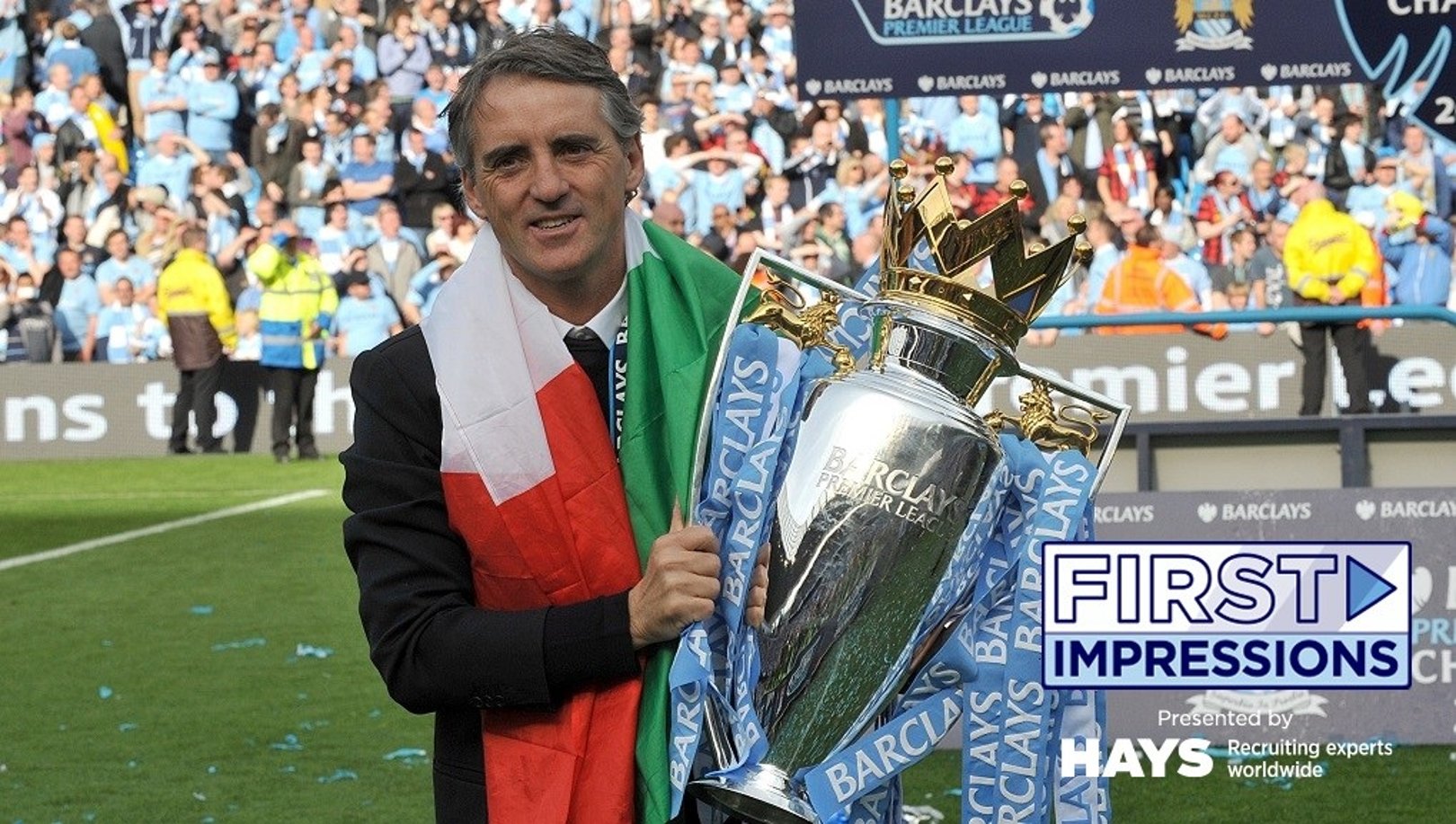Roberto Mancini arrived at City with a record of success and a desire to create history with his new club. Thirty minutes in his company and it was clear he wouldn’t accept anything less…
If anyone ever doubted Roberto Mancini’s pedigree, they should take a quick glance at his personal trophy cabinet, which hopefully rests on reinforced floorboards in his Italian family home.
With some 23 winners’ medals from his playing and managerial career to date, not to mention his Italian Footballer of the Year and Serie A Player of the Year double or his Manager of the Year award in 2007 while boss of Inter Milan.
Whichever way you look at his achievements, there can be no doubting that Mancini is one of life’s winners.
Now he has been given the opportunity of bringing the glory days back to City and he is relishing the prospect of making the Club a force in world football - and the good news is he has consistently delivered the goods wherever he has been.
Since taking over from Mark Hughes in December, Mancini has begun to mould a team in his image, though there is no fast track to overnight success, more’s the pity. City’s first Italian manager wants to build an empire that will go from strength to strength and he is already targeting the Premier League title for next season.
And why not? The Club has already demonstrated it can attract some of the biggest names in world football over the past couple of years and there could well be more to come.

In choosing Mancini to lead City to the next level, the Club’s owners have chosen wisely, but there has been no real, in-depth interview with the Blues’ boss since he arrived late last year. Until now.
This writer has been fortunate to be able to speak to the manager on a weekly basis since January and he has never been less than polite, patient and engaging. The venue of the interview is his office at the City of Manchester Stadium, a plush room with a flat screen mounted TV, comfortable chairs and a smart refreshments area.
One could imagine Carlo Ancelotti dropping by for a glass of red wine after the match or perhaps Arsene Wenger stopping in for a quick chat and a healthy discussion about the referee’s performance.
Relaxed and smiling as ever, Mancini takes a quick call on his mobile, informing the guy at the other end to act quickly regarding whatever the discussion concerned. “Si, si, pronto, pronto!”
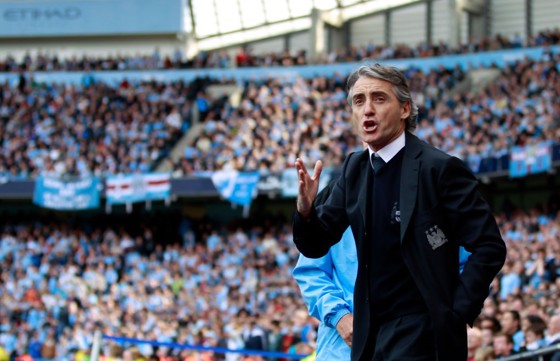
Dressed in a stylishly casual way only the Italians and French can seem to pull off, the manager of Manchester City takes his seat as I comment about gaining a privileged glimpse at one of the Club’s inner sanctums.
“You’ve never been in here before?” asks Roberto. I say I haven’t. He looks surprised. “Now you have,” he grins.
If football is religion for millions of people around the world, Roberto managed to combine both during his days as an altar boy in his home town of Jesi (pronounced ‘Yey-see’).
Born on November 27, 1964, Roberto was raised a devout Roman Catholic by his parents Aldo and Marianna. Football and the church crossed paths many times, but there is one story that perhaps shows that, even as a young boy, his talents on the football pitch were already suggesting divine inspiration.
The tale goes that there was an important game for Roberto’s youth team, Calcio, taking place at the same time as his first Holy Communion. Hearing the team were losing 2-0, the local priest – also a coach of the said team – asked Roberto whether he had his kit and boots with him.
On discovering the said items were in the changing rooms, the priest suggested he should maybe go and join his team-mates, by quietly slipping out the side entrance! Whether it’s true or not, I don’t enquire - it’s such a charming story that it seems perfect to lead into Roberto’s early days.
“Jesi is a town in Italy, not too far from the sea,” he began. “It has a population of around 45,000 people so it’s not exactly small - it’s not far off an average home game attendance at the City of Manchester Stadium, I suppose.
“My mother worked as a nurse and my father worked as a carpenter and also did masonry, so it was a nice steady home life.”
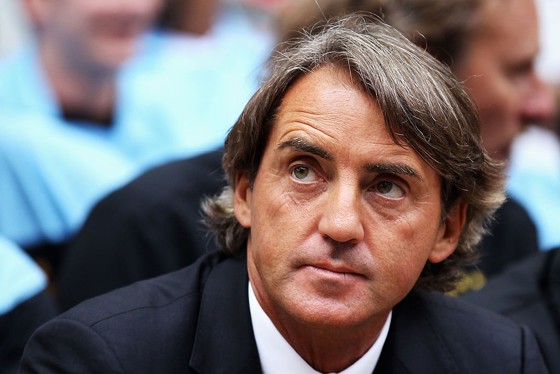
The idyllic pace of life in Jesi meant that Roberto’s father was always on hand to kick a ball around with his son and advise him during his formative football. Like most dads, he’d played himself, but not for any reason other than pleasure.
“My father was an enthusiastic amateur and he played, but not professionally,” said Roberto. “He loves football and I think he wanted me to be a footballer because of the life it could possibly give me and because of the pleasure it had given him.
“When I was small, we used to go to the football pitch at the back of our home and play every day after school. We’d practice, practice, practice and if he was busy, I’d play with my friends instead. They were very happy days for me.
“My father had a friend in Bologna and eventually, I think he thought I might have a future in the game so he told him that he felt I was worth a trial. Bologna had a terrific reputation for nurturing young talent and an academy that is not dissimilar to the one we have here at City.
“They gave me my chance to show what I could do and after playing for just one hour, they decided they wanted to sign me. I was just 13 and that meant moving to their residential academy some 200km away.
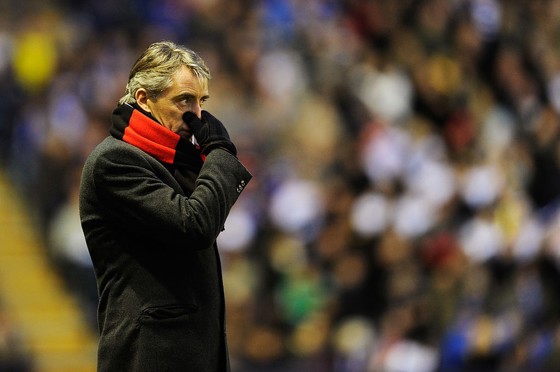
“It was a very difficult period of my life because I was very young and was a long way away from my parents and friends. It was something I had to get through because obviously, I wanted to be a footballer and that involves making sacrifices, but it was very hard, too.”
Though there were numerous other famous Italian sides closer to his Jesi home, there was only one side Roberto loved as a youngster. Following in the footsteps of his old man, he supported the side known as the ‘Old Lady’...
“As a boy my idols were Juventus,” he smiled. “They are one of the most popular teams in Italy and from around the age of six, I would travel with my father to watch them play every home game. It would take us 10 hours on the bus to get from Jesi to Turin, but I have very happy memories of those times.
“Up to around 13 years ago there were only two channels in Italy so football wasn’t on TV all the time like it is today. It made going to the matches even more special and so when I would go to the Stadio delle Alpi to watch Juve, I would get very emotional because it meant so much to me.
“We spoke about football all the way there and all the way back. I remember my first European Cup game for Juve, the first league game – everything! Great memories....
“All the team were my heroes rather than just one player. I couldn’t just choose one. Dino Zoff, Roberto Bettega, Gaetano Scirea – all great players. I remember when they played City in 1976 in the UEFA Cup. I don’t remember going to the game, but I know Juve won the second leg 2-0 to go through 2-1. I think Brian Kidd scored the winner in the first leg!
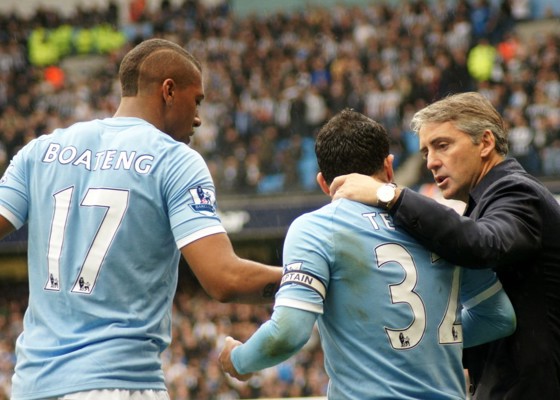
“I suppose that was my first time I think City came into my consciousness and I always remembered the sky blue shirts they wore, but there were many great Italy/England duels during the 1970s. The games between the national teams were always closely-fought and I remember Derby County, Arsenal and Liverpool always caused Italian sides problems.”
Meanwhile, the teenage Mancini was proving to be something of a protégé and his club manager decided he’d seen enough in training to pitch the youngster in at the deep end after just three years at the academy. It was to be the start of a glittering playing career that would see his silky skills make him one of the country’s most promising talents.
“I made my debut for Bologna when I was just 16-years-old – very, very, young to be playing Serie A football – but I did well and scored nine goals during my first season. Despite this, we were relegated and I was sold to Sampdoria.
“In truth, I could have gone to almost any top club in Italy, including Juventus, because they all expressed an interest in signing me. Sampdoria had a wonderful chairman and I liked the challenge of going to a club who had never won any major honours before. In all honesty, I’m not sure why I didn’t choose Juve considering my allegiance to them.”
Roberto’s choice proved to be inspired. He helped the Genoese club to become a major force in Serie A and Europe and, for the first time, Sampdoria were crowned champions of Italy.
“I ended up staying for 15 years at the Marassi and during that time, we won everything,” he recalled. “It’s a fantastic thing to play for a club like Barcelona or Real Madrid, but to play for a team who has won very little and help them achieve great things is, I believe, better. To help change the history of a club is incredible and you will stay in the memories of all that team’s supporters for many years.”
Roberto was a success on the international stage, too, earning 34 caps for Italy over a 10-year period from 1984 to 1994, though being a flair player, he was perhaps underused by a succession of overly-cautious Italy bosses.
Mancini’s playing style had elements of Gianfranco Zola, Teddy Sheringham and a dash of Brazilian magic thrown in. Some of his goals were World Class and he was technically superb with his team-mates at Sampdoria bringing out the best in him. Gianluca Pagliuca, Gianluca Vialli, Toninho Cerezo, Pietro Vierchowod and Attilio Lombardo – the names roll off the tongue.
“On personal level, things couldn’t have gone better for me,” he said. “I hold all the club records with Sampdoria from appearances through to goals and the fans have never forgotten me and I doubt they ever will. It was an amazing time for all of us.”
All good things eventually come to an end, however, and after 15 years with the same club, a parting of the ways seemed best for all parties. With 566 appearances and 171 goals, he remains a club legend, but he needed a new lease of life to see out his playing days. His move to Rome would prove he had something of a Midas touch...
After countless trophies and a European Cup final defeat to Barcelona, Mancini decided to move on while he still could.
“After such a long time with one club, by the time I was 32 I decided to play elsewhere and find a new challenge,” he said. “In 1997 I signed for Lazio – another club who had never won anything – and during my three years in Rome we won the Serie A, the European Cup Winners’ Cup – seven trophies in all.
“I then became assistant manager to Sven Goran Eriksson, but after six months he was sacked because he’d agreed to become the next England manager and so Lazio decided to make a change. That sort of spelled the end of my time with them.”
Mancini has always had a great respect and a fascination for English football and so when an opportunity arose to perhaps have one last hurrah as a player, he accepted it willingly, albeit in the inauspicious surround of the East Midlands.
“Yes, I had always wanted to come to England so I signed for Leicester City in 2000,” he said. “Sven spoke with the manager of Leicester and asked if I’d like to come and play for them, so I did and I really enjoyed my time with them, brief though it was.
“I have very good memories of Leicester. I only played five games, but I enjoyed working for the manager and with the players. It wasn’t long enough, but I made lasting friendships all the same.
“I took Robbie Savage out for dinner at an Italian restaurant in Leicester and introduced him to Italian cuisine. We had penne pomodoro and spaghetti and I don’t think he’s ever forgotten it!
“But after one month, Fiorentina contacted me and offered me the manager’s job, which I accepted, so I returned to Italy. I would have liked to stay in England longer but this was a chance to manage on my own for the first time. I stayed with Fiorentina for one year and we won the Italian Cup, but the club had major financial problems and I when the chance arose, I returned to Lazio, but this time as manager.
“I stayed there for two years and won the Italian Cup once again and also took the club into the Champions League and then I was offered the role as boss of Inter, which I accepted.
“We had to work very hard and in my first year we won the Italian Cup and qualified for the Champions League. The next year we won the Serie A title for the first time in 20 years and won 17 games in a row at one point. I enjoyed great success and had many happy times at Inter and by the time I left, we had won seven trophies in four years.”
Roberto’s record as a player and a manager is remarkable and it all bodes well for City. He’s won trophies at every club he’s been at – Leicester apart – and he seems to attract silverware like a magnet.
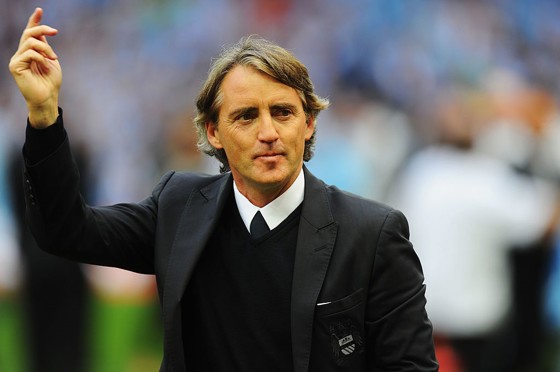
So how does a great player make the transition to become a great manager? It’s a path trodden by a precious few but though there are obviously elements adopted from other managers along the way, much seems to be due to instinct and natural leadership that perhaps cannot be taught.
“I have my own mind and my own ideas, but I have taken influences from people like Eriksson, Vujadin Boskov who I worked with for many years,” said Mancini. “Those two managers in particular were very important to me because they were different in so many ways and had a completely different ethos, were totally different characters and I’ve taken a little bit of knowledge and added it to my own.
“I think the most important thing I try to instil in my players is that they must always believe that they can win – we need a winning mentality at this club because eventually, it pays off. It doesn’t happen overnight and can take maybe six or eight months to really be absorbed, but if you are prepared to work hard every game, you will always have a chance of being successful. It’s a simple observation, but very true - you can’t win anything without working hard.
“I want to win a lot of trophies with this club. I think our fans are incredible and it makes me more determined than ever to bring them success – when we win our first trophy it will be a very good moment for everyone, I think.
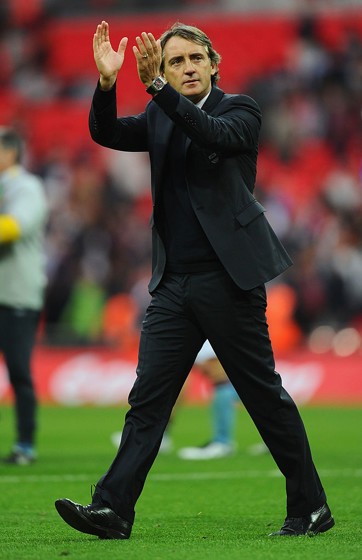
“For my part, I am taking English lessons every day. If you study intensively, you soon pick it up though learning a new language at the age of 45 isn’t easy! I have a basic grasp of English and it’s important I always speak English when I’m here because that is the quickest way of learning.
“If I make the odd mistake, it is only to be expected because this is a new country for me and I’ve only been speaking English for the past few months. It has been a hectic six months and I’m looking forward to a rest now for a few weeks.
“I love being with my family, of course and I miss them when I’m working. I will watch the World Cup on TV with my sons and just relax and rest as much as I can. Football will never be far from my mind but it is a chance to recharge my batteries.
“It will be an interesting summer but it would be nice if Italy made it to the final, but I think it will be difficult. When I return to Manchester I think it is vital we have a good pre-season and I’m looking forward to it already. A lot of players will be at the World Cup and will maybe arrive back a little later, but we will have plenty of time together.”
And what fate will befall the famous Mancini scarf? Roberto smiles at the mention of what has become something of a trademark over the past six months.
“I usually wear a scarf on the side-lines because I get pain in my neck if it’s cold,” he grinned. “I arrived in December and it wasn’t so warm, so before my first game, our communications executive Vicky Kloss gave me her City scarf and that was that. I’m very happy that it became something of a fashion item.”
And next season...?
“I’m not sure what I will do – it will be a surprise!”
What happened next? Mancini did indeed deliver. He helped City qualify for Champions League football for the first time before leading the Club to FA Cup glory in his first full season as boss. A year later, he made good on his promise and delivered the Premier League title, ending a 44-year wait to be crowned champions of England. It’s unlikely Mancini, who left in 2013, will ever be forgotten by City fans.

